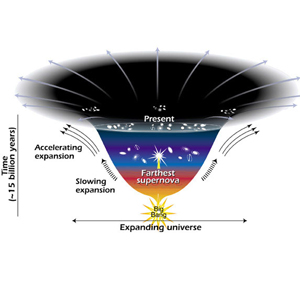
"We have convincing evidence that there is some kind of dark energy out there - that is, some antigravity substance that makes up 70% of the universe and is accelerating its expansion," said lead author of the research, astrophysicist Sourish Dutta, from the Vanderbilt University in Nashville, Tennessee.
"We just don't know what the nature of that substance is," he said.
The pop of virtual particles
Dutta and colleagues have come up with a theory that dark energy is related to vacuum energy, the underlying background energy of empty space. Quantum mechanics predicts that a vacuum - such as space - is dotted with 'virtual particles' that pop in and out of existence. This sub-atomic activity could be the key to dark energy.
If so, it should be possible to test the researchers' theory by studying changes in the expansion rate of the universe, they say. Their ideas are published in the journal Physical Review D.
"One of the things that is very unsatisfying about many of the existing explanations for dark energy is that they are difficult to test," says co-author astrophysicist Robert Scherrer, also from Vanderbilt University.
"We designed a model that can interact with normal matter and so has observable consequences," he said.
The new theory is one of several models that describe dark energy as basically a cosmological constant - the antigravity first predicted by Einstein when he wrote his theory of general relativity. Cosmologists call this background antigravity effect quintessence.
A cosmological constant
Because quintessence has never been detected directly, scientists have so far assumed it doesn't interact with ordinary matter, but Dutta and his team suggest that it does.
They say dark energy may have caused the universe to 'freeze' - slow down dramatically in its expansion as the universe cooled - 11.5 billion years ago, just 2.2 billion years after the Big Bang. And this 'slowing down' should be detectable by planned astronomical surveys of distant supernovae, such as NASA's Joint Dark Energy Mission.
"By making very accurate measurements of supernovae, future surveys will be able to map out the expansion rate with very high accuracy," said Dutta.
Scientists will be able to use that data to make a plot of the "equation of state parameter", which describes the ability of dark energy to accelerate the universe, he told Cosmos Online. "Our model is pretty unequivocal about the shape of that plot."
If matter and dark energy interact, this would also cause the dark energy field to manifest itself as new and exotic subatomic particles that could be detected in particle colliders, such as the Large Hadron Collider, he said.
Astronomer Brian Schmidt, from the Australian National University, in Canberra, who specialises in supernovae studies, said the paper was "interesting" if "fairly controversial".
The model suggests that "if we look back in time dark energy would not have been as repulsive as it is now", said Schmidt. "This is interesting as there is no real way to get out of that [prediction] - it is something we can test. If the universe is like this, it is something that is challenging to detect, but it is possible,"
But, he questioned whether the model bears any resemblance to the real world.



Reader Comments
to our Newsletter